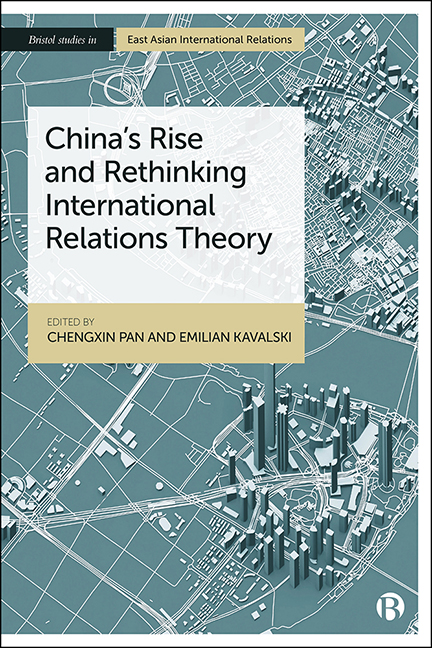Book contents
- Frontmatter
- Contents
- List of Abbreviations
- Notes on Contributors
- Acknowledgements
- Introduction: The Rise of China and Its Challenges to International Relations Theory
- PART I Theorizing China’s Rise: Beyond Eurocentric Knowledge Production
- PART II Theorizing China’s Rise: Critical Reflection on Mainstream Frameworks
- Epilogue: Towards International Relations beyond Binaries
- Index
10 - China’s Rise as Holographic Transition: A Relational Challenge to International Relations’ Newtonian Ontology
Published online by Cambridge University Press: 15 September 2022
- Frontmatter
- Contents
- List of Abbreviations
- Notes on Contributors
- Acknowledgements
- Introduction: The Rise of China and Its Challenges to International Relations Theory
- PART I Theorizing China’s Rise: Beyond Eurocentric Knowledge Production
- PART II Theorizing China’s Rise: Critical Reflection on Mainstream Frameworks
- Epilogue: Towards International Relations beyond Binaries
- Index
Summary
Introduction
The study of China's rise in International Relations (IR) is at a crossroads. Every conceivable question about the rise of China seems to have already been asked, and nearly every theoretical perspective has been deployed to shed light on this remarkable phenomenon. In the face of an extremely diverse and still-growing body of literature, one wonders what else may be added to the booming debate on China's rise. To some, the attention should now focus more on rigorous empirical testing of existing competing perspectives (Kang, 2003/04; Chen, 2012: 71). To others, the rise of China demands nothing less than the search for a new vocabulary (Kavalski, 2014) and the further development of IR theories, perhaps particularly from Chinese perspectives (Zhao, 2009; Qin, 2009; 2010; 2016; 2018). Such emphases on further empirical and theoretical investigations are indeed necessary, and many scholars have already contributed interesting findings and stimulating insights (Kang, 2007; Zhu, 2008; Buzan, 2010; Glaser, 2011; Garlick, 2016; Hameiri and Jones, 2016; Pan and Lo, 2017; He, 2021). In this chapter, I take a different approach and turn attention to a hitherto seldom examined aspect in the China debate, namely its ontological underpinnings.
Just as mainstream IR theories are substantialist in their ontological orientations (Jackson and Nexon, 1999: 293; Pan, 2021), the dominant approaches to China's rise have been informed by a substantialist ontology. In the otherwise heated China debate, what is rarely questioned is a shared ontological assumption about China as a more or less independent and self-contained entity. This assumption is based on a classical Cartesian/Newtonian worldview, which has not only heavily shaped the development of modern science, but also influenced the ways social scientists understand human society. In the IR context, this conventional ontology assumes that the international system is made up of largely self-contained (though possibly interdependent and/or potentially socializable) units such as sovereign states, each possessing a certain essential and distinctive identity and occupying a more or less clearly demarcated territorial space. With the China debate so far largely silent on the issue of ontology (with the possible exception of Zhao Tingyang's and Qin Yaqing's works, for example Zhao, 2006; Qin, 2009; also Chapter 3), China's rise has been framed primarily within this conventional ontological parameter.
- Type
- Chapter
- Information
- China’s Rise and Rethinking International Relations Theory , pp. 210 - 233Publisher: Bristol University PressPrint publication year: 2022



